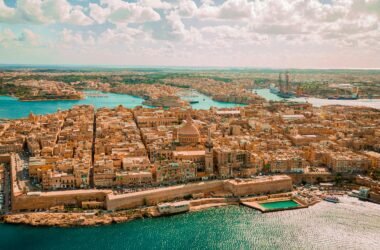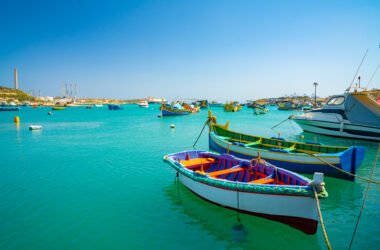At Expatax, our mission is to demystify the tax landscape for expatriates and retirees, making it more accessible and understandable. Beyond the insights shared in this article, we welcome readers to delve deeper into their tax queries using our TAX AI for more personalised guidance.
Retiring in Malta: Mediterranean Lifestyle And Safety
Nestled at the heart of the Mediterranean, Malta is an attractive destination for those seeking a blend of warm climate, rich culture and a relaxing lifestyle. This archipelago, known for its picturesque landscapes and historical sites, offers more than just beaches and low tax rates. The laidback Mediterranean lifestyle is a key draw for retirees who wish to spend their golden years in a safe yet vibrant setting. Outdoor activities, from leisurely strolls along the coastline to exploring ancient ruins, ensure your days are as active or relaxed as you desire.
Tax Advantages for Foreign Retirees in Malta
Malta stands out not only for its lifestyle but also for its favourable tax regime for foreign retirees. Through programs such as the Malta Retirement Programme (MRP), expatriates can benefit from a 15% flat tax rate on foreign income remitted to Malta, with the added advantage of not being taxed at all on foreign income not brought onshore. Better still, European and EEA citizens benefit from these tax advantages without any requirement to apply for a visa. This tax-friendly environment makes Malta an attractive destination for those looking to optimise their retirement funds while enjoying a high standard of living.
Residency Requirements For EU/EEA Retirees in Malta
For EU/EEA citizens and Swiss nationals, the pathway to residency as a retiree is very simple, and generally done via a Self-Sufficiency application. The requirements include having a valid identification, proof of residence within Malta, and a minimum passive income or savings set aside. The requirements are very modest by international standards:
- Single applicants must demonstrate financial stability by showcasing either a minimum of €14,000 in their bank account or a stable weekly income of €84.95 over the last six months.
- Married couples need to present a capital of at least €23,300 or a weekly income of €93.10.
- Originals and copies of financial statements are required.
- Additionally, comprehensive health insurance covering both in-patient and out-patient treatments is necessary, with the policy document to be presented.
- Applicants should also provide a copy of their passport or ID card, alongside the original for verification.
- While a rental contract isn’t a strict requirement, it’s advised to have some form of address proof, such as a rental agreement or any document indicating a stay or intention to stay in Malta for at least 3-6 months, to ensure the accuracy of your residency application.
Generally speaking, Identity Malta (now knowns as Identità) won’t accept the application until you’ve spent 3 months in the country, and will ask to see proof in the form of transactions in your bank statements.
Again – the above does not apply to non-EU/EEA citizens (see below for further info).
Residency Requirements For Non-European Retirees in Malta
The right to reside in Malta as a non-EU citizen – for instance, for British or US expats – is somewhat more complex to acquire.
Malta Retirement Programme (MRP) Requirements for Non-EU Nationals
The Malta Retirement Programme is designed to attract individuals from outside the EU, EEA, and Switzerland who wish to spend their retirement years in Malta. Key requirements include:
- Property Ownership or Rental: Applicants must either own property in Malta (excluding the south of Malta) worth a minimum of €275,000, or in Gozo or the south of Malta for at least €220,000 if purchased after 1 July 2013. Alternatively, renting a property in Malta (excluding the south) requires an annual lease of €9,600, or €8,750 in Gozo or the south of Malta.
- Pension Income: The applicant must receive a pension that accounts for at least 75% of their annual income, which must be sufficient to maintain themselves without needing Malta’s social assistance. This pension must be evidenced and remitted to Malta.
- Minimum Stay: An applicant must reside in Malta for a minimum of 90 days per year, averaged over five years, and not stay in any other single country for more than 183 days within the same year.
- Health Insurance: Comprehensive health insurance covering in-patient and out-patient treatment in Malta is required.
- Fit and Proper Test: An up-to-date police conduct certificate is necessary to demonstrate the applicant’s good standing.
- Language: The ability to communicate in either English or Maltese is required.
- Tax Obligations: A minimum tax of €7,500 annually applies, plus an additional €500 for each dependent included in the application.
Global Residence Programme (GRP) for Non-EU Retirees
The GRP offers another route for non-EU nationals seeking a retirement solution in Malta. While specific requirements can vary, this programme generally involves:
- Property Requirements: Similar to the MRP, though the financial thresholds and conditions can differ.
- Income Remittance: A requirement to remit income to Malta, with favourable tax rates applied to foreign income.
- Annual Tax and Fee: Participants may be subject to an annual tax and a non-refundable application fee.
Additional information is available for retirees who are interested in these two paths to residency in Malta.
Strategic Location within the European Infrastructure
Those concerned that Malta’s modest size may constrain their desire to enjoy their retirement to the fullest will probably be relieved to discover just how well connected the country is to international destinations.
Malta, despite its modest size, boasts an exceptional level of global connectivity that belies its geographical footprint.
Central to this connectivity is the Malta International Airport (MLA), the archipelago’s sole airport, which serves as the primary gateway for international visitors and expatriates moving to or from Malta. Strategically located in the Mediterranean, just south of Sicily, Malta offers an enviable bridge between Europe and North Africa, making it a pivotal hub for business, tourism, and cultural exchanges.
International Flights From Malta International Airport
Malta International Airport is a bustling hub that facilitates Malta’s connections with major European cities, North Africa, and Middle Eastern destinations, offering direct flights to the UK, Italy, France, Germany and several other European countries, operated by various international and low-cost airlines such as Easyjet and Ryanair. This extensive network makes travel to and from Malta convenient for both short visits and long-term stays, ensuring that expatriates and retirees can easily maintain close ties with their home countries or explore new destinations. The airport itself is equipped with a range of passenger amenities, reflecting Malta’s warm hospitality and efficient services.
Furthermore, Malta’s EU membership enhances its connectivity, providing additional travel rights and conveniences for EU citizens, including seamless travel across Schengen Area countries. This, combined with English being one of the official languages, significantly eases the transition for expatriates and contributes to Malta’s appeal as a cosmopolitan and welcoming destination for people from all corners of the globe.
Language And Cultural Aspects Of Retiring in Malta
Tax and weather aren’t everything in life. Malta’s attractiveness to retirees includes accessible language, pervasive healthcare system, culture, and opportunities for lifelong learning.
English and Italian Are Commonly Spoken
For English-speaking expats, the transition to life in Malta is made smoother by the widespread use of English. As one of the two official languages, alongside Maltese, English is spoken fluently by practically the entire population, and is the lingua franca for the substantial number of expats in the country. Additionally, Italian is also very popular and spoken fluently by most people born before 1990, as a result of Italian television being a superior alternative to the local Maltese programmes before the advent of satellite TV and English-language programmes.
Opportunities For Cultural Integration
It is very common for integration and social life to rank last in an expat’s wishlist after weather, lifestyle and tax – only to discover that it is the most important factor post-move.
Integration into the Maltese community is an aspect that deserves attention. Malta has a rich cultural heritage and a vibrant social scene that offers numerous opportunities for retirees to engage with locals and other international residents. Some communities, such as the British, Italian, Swedish and French, are quite numerous. Understanding Maltese traditions, such as festas, participating in local festivals, and getting involved in community activities can significantly enrich the expatriate experience.
Education and Learning Opportunities
For retirees interested in personal development or expatriates moving with family, Malta’s education system and learning opportunities are noteworthy. Malta offers a range of educational facilities, including international schools that follow British or American curricula, making it easier for expat children to continue their education seamlessly. Furthermore, the University of Malta and other institutions offer adult learning courses, ranging from academic degrees to casual classes in arts, languages, and other skills, catering to the lifelong learner.
Availability of Healthcare in Malta
The quality and accessibility of healthcare services are crucial for retirees and expatriates. Malta is known for its high-standard healthcare system, including both public and private services. Understanding how to access healthcare services, registering for health insurance, and navigating the Maltese health system are important steps for expatriates. Special attention should be given to healthcare planning, particularly for retirees or those with specific medical needs, to ensure a smooth and worry-free stay in Malta.
Real Estate and Living Accommodation
Finding the right place to live is essential to enjoying life in Malta. The real estate market in Malta offers a wide range of options, from modern apartments to traditional Maltese townhouses. Familiarising oneself with the property market, understanding rental agreements, or considering property purchase requires careful research. It’s also beneficial to explore different areas of Malta and Gozo to find a location that best suits one’s lifestyle preferences and needs.
Economic Activities and Investment Opportunities
For those interested in economic and investment opportunities, Malta presents a dynamic and inviting business environment. The island’s economy is diversified, with strong sectors like tourism, iGaming, financial services, and blockchain technology. Exploring investment opportunities, understanding the regulatory environment, and connecting with the local business community can open new avenues for personal and financial growth.
Conclusion: Further Information About Retiring in Malta
While Malta offers a picturesque setting and favourable conditions for retirees and expatriates, thorough preparation and understanding of all facets of Maltese life—from cultural integration to healthcare and education—can significantly enhance the living experience in the small archipelago.
As a next step, consider asking our TAX AI for further information and, if you like, a consultation with one of our experts.








Comments 1